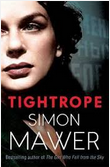 Belief. Blackmail. Bribery. These are the three motivations for betrayal that one of the several spymasters in Simon Mawer’s new novel “Tightrope” give to Marian Sutro in the cold, gray world of dreary post-war London. “Tightrope” picks up shortly after the end of “Trapeze” (reviewed here), Mawer’s novel of Marian’s heroic deeds and miscues as a member of the Special Operations Executive parachuted into France. If you haven’t read the earlier book, skip to the end of this paragraph to avoid spoilers. Marian is returning to London after a year and a half in the custody of the Germans, first at Gestapo headquarters in Paris, then at a concentration camp. It takes a while for Marian to be able to return to daily life, and Mawer’s descriptions of her psychological struggles, which include some breakdowns and thoughts of suicide, are fully credible. Marian takes a job at the Franco-British Pacific Union; she marries. Horrified at the destruction caused by the atomic bombs dropped on Hiroshima and Nagasaki Marian has also become an ardent advocate for peace. It’s a wedge between her and her husband, and threatens to become one between Marian and her beloved brother Ned, an atomic scientist.
Belief. Blackmail. Bribery. These are the three motivations for betrayal that one of the several spymasters in Simon Mawer’s new novel “Tightrope” give to Marian Sutro in the cold, gray world of dreary post-war London. “Tightrope” picks up shortly after the end of “Trapeze” (reviewed here), Mawer’s novel of Marian’s heroic deeds and miscues as a member of the Special Operations Executive parachuted into France. If you haven’t read the earlier book, skip to the end of this paragraph to avoid spoilers. Marian is returning to London after a year and a half in the custody of the Germans, first at Gestapo headquarters in Paris, then at a concentration camp. It takes a while for Marian to be able to return to daily life, and Mawer’s descriptions of her psychological struggles, which include some breakdowns and thoughts of suicide, are fully credible. Marian takes a job at the Franco-British Pacific Union; she marries. Horrified at the destruction caused by the atomic bombs dropped on Hiroshima and Nagasaki Marian has also become an ardent advocate for peace. It’s a wedge between her and her husband, and threatens to become one between Marian and her beloved brother Ned, an atomic scientist.
Mawer moves fairly slowly through Marian’s early post-war years, as his narrator pieces together Marian’s actions. It’s not altogether easy to do so, as Marian has had good training from the secret services, and knows how to cover her tracks. In “Trapeze,” Mawer describes Marian as a woman who is temperamentally an impetuous risk-taker whose behavior extends to her sexuality. As she matures in “Tightrope” Marian grows less impetuous – of course she’s experienced what Mawer describes as the full range of fear, from anxiety to outright terror – as her experience of fear slows her down. She remains in control of her sexuality, and feels able to act as she wishes, when she wishes – which means she seduces, or is seduced by, several men not her husband. It’s a nice contrast to the experience of her brother, Ned, whose sexual activities, in the 1950s when homosexual acts were against the law in Britain, can’t help but be compromising.
Novels about spies can be convoluted, with complex plots that are difficult to follow. Mawer remains close to Marian’s point of view for much of the narrative, and the reader is able to follow Marian’s view of events as they play out, even as she speculates about the moves, motives, and knowledge of the people – they are all men – she deals with. One motif is kriegspiel or blind chess; as a child in Geneva Marian had served as referee in her brother’s games with Clément Pelletier, who grew up to become the nuclear scientist Marian helped extract from Nazi-occupied Paris. Marian would like to see herself as the referee in the grand game she is playing, but comes to realize that she is, rather, one of the players. What she does about it, and the consequences, make up the final part of the book.
“Tightrope,” though a long novel, remains compelling and engaging, if perhaps not as taut as “Trapeze.” It’s a worthy follow up all the same, and a deeply interesting story of what motivates some people to acts the many of us might consider foolish, painful, or treasonous.
Have a book you want me to know about? Email me at asbowie@gmail.com. Follow me on twitter @abowie917.


